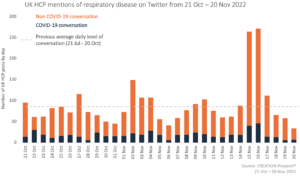Each month, CREATION.co’s respiratory tracking update brings you the latest insights into the online UK healthcare professional (HCP) conversation regarding respiratory disease.
This month between 21 October and 20 November, the activity of UK HCPs discussing respiratory disease online decreased by 920 posts, dropping below 3,000 mentions and only surpassing the previous average daily level of conversation on 10 days.

This month UK HCPs were most active on 16 November, posting about respiratory diseases 271 times. This was in response to two events that took place around this time, one being World COPD day, a campaign which aims to raise awareness, share knowledge, and discuss ways to reduce the burden of COPD worldwide. This year’s theme was “Your Lungs for Life” highlighting the importance of lifelong lung health and what we can do to promote lifelong lung health as well as protect vulnerable populations.
UK HCPs showed their support for the campaign online and used the opportunity to present arguments as to why improved care is needed within the therapy area – this aligns with CREATION’s recent webinar in which awareness is an important facet of an eHCPs’ digital day, particularly on awareness days.
Today is #WorldCOPDDay. I’m joining @asthmalunguk to help raise awareness of the need for more research into #COPD. Less than 1% of UK public funding is spent on COPD even though it affects more than 1 million people.
👀 ⬇️
Find out more here: https://t.co/2GRY3gWFVW pic.twitter.com/o1diOvwRR8— John Hurst (@ProfHurst) November 16, 2022
The most shared post amongst UK HCPs in the respiratory disease online conversation was from the most active of them this month – ‘Professor of Respiratory Medicine John Hurst, who posted 38 posts this month. He summarised the updated guidelines from the Global Initiative for Chronic Obstructive Lung Disease. Many HCPs were pleased that John Hurst had taken the time to summarise the changes and found the updates of interest, with new things to consider in their work. However, some HCPs did share their irritation with the news, highlighting their opinion that the new guidelines are a source of frustration and that the update comes at an inconvenient time for them as they had become comfortable with the previous guidelines.
👀it’s out! The llatest 2023 @GOLD_COPD guidance has been released…
🌟There are BIG changes this year. Here are my first thoughts… but lots to digest:
TL/DR:
1. Revised #COPD defn
2. Etiotypes
3. ABCD is out, ABE is in
4. Farewell ICS-LABA
5. New exacerbation defn1/n👇
— John Hurst (@ProfHurst) November 14, 2022
The other driver behind respiratory disease online conversation on 15 and 16 November was the ruling from a coroner which found that in December 2020, 2-year-old Awaab Ishak died as a result of a severe respiratory condition caused due to prolonged exposure to mould in a home environment. This finding led to the revelation that more than a million people in England are living in social homes beset with damp, pests, asbestos and overcrowding. UK HCPs ensured they were not quiet on this matter and implored authorities to not let tragic cases like Awaab Ishak happen again. Research was shared which showed the damaging effect damp homes have on health particularly for children where living in cold, damp housing damages their lungs increases their risk of infections, asthma & being hospitalised.
Living in cold, damp housing damages children’s lungs
Increases their risk of infections, asthma & being hospitalised
Thousands of children in London are living in housing that’s making them sick
Parents shouldn’t have to beg to landlords, for their homes to be made habitable pic.twitter.com/TpVL2XXURV
— Dr Sonia Adesara 💙 (@SoniaAdesara) November 16, 2022
Each month, we track the HCP conversation relating to respiratory disease.
You can keep up to date with this and other pharmaceutical tracking updates, including COVID-19 developments, within the Tracking section of CREATION Knowledge, or sign up to receive our monthly eJournal with all of our latest HCP insights.
If you would like to dig deeper into what we have seen this month then please do get in touch.
Methodology
- This article analysed the Twitter conversations of HCPs in the UK discussing respiratory disease and related terms between 21 October and 20 November 2022 using CREATION Pinpoint®.
- Between 21 October and 20 November 2022, there were 2,762 UK HCP mentions of respiratory disease and related terms, from 1,326 unique UK HCP authors.
View the latest Respiratory Tracker here
 By Mark Sullivan
By Mark Sullivan 
